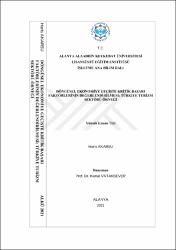| dc.contributor.advisor | Vatansever, Kemal | |
| dc.contributor.author | Akarsu, Haris | |
| dc.date.accessioned | 2022-03-08T10:29:35Z | |
| dc.date.available | 2022-03-08T10:29:35Z | |
| dc.date.issued | 2021 | en_US |
| dc.date.submitted | 2021-12-10 | |
| dc.identifier.uri | https://hdl.handle.net/20.500.12868/1480 | |
| dc.description.abstract | Mevcut ekonomik sistem, kaynakların elde edilmesi, işlenmesi ve tüketilmesi adımlarıyla gerçekleşen doğrusal bir yapı sergilemektedir. Bu yapı, gezegenimizdeki kısıtlı kaynakların hızla tükenmesine ve yüksek miktarda atık üretilmesine neden olmaktadır. Döngüsel ekonomi, doğrusal ekonomi modeline bir alternatif olarak ortaya çıkan ve son yıllarda küresel çapta kabul görmeye başlamış olan bir ekonomik modeldir. Döngüsel ekonominin temel amacı, üretim ve kullanım sonucu oluşan atıkların, yeni ürünler için birer kaynak olarak kullanılması yardımıyla, doğrusal yapıyı döngüsel bir hale getirmektir. Bu amaç, aynı miktarda üretim için daha az miktarda el değmemiş kaynak kullanılmasını ve kaynak fiyatlarının üzerindeki baskının kırılmasını mümkün kılacaktır. Dünya genelinde döngüsel ekonomi üzerine yapılan çalışmaların sayısı gitgide artmakla birlikte bu çalışmaların ağırlıklı olarak üretim sektörünü hedef alan çalışmalar olduğu, turizm sektörü üzerine yapılmış olan uygulama sayısının kısıtlı olduğu görülmektedir. Ülkemizde de genel anlamda döngüsel ekonomi üzerine yapılmış araştırma sayısının oldukça kısıtlı olduğu görülmektedir. Bu tez çalışmasının öncelikli amacı, yerli literatürde henüz karşılığını bulamamış olan döngüsel ekonomi kavramının detaylı bir şekilde ele alınarak tartışmaya açılmasını sağlamak ve konu ile ilgili tüm paydaşlara faydalanabilecekleri bir kaynak oluşturmaktır. Ayrıca konunun turizm sektörü özelinde incelenecek olması ile birlikte küresel akademik literatüre de katkı sağlanması hedeflenmektedir. Araştırmada, geniş çaplı literatür taraması sonucu belirlenen 8 adet kritik başarı faktörü, Aralık Tip-2 Bulanık AHS yöntemi kullanılarak sıralanmıştır. Araştırmanın sonucunda, 'Üst yönetimin adanmışlığı ve liderliği' kriterinin, turizm işletmelerinin döngüsel ekonomiye geçiş sürecinde en önemli kritik başarı faktörü olduğu ortaya çıkmıştır. | en_US |
| dc.description.abstract | Current economic system shows a linear pattern that consists of taking natural resources, making, and consuming products. This pattern causes the exhaustion of limited resources of our planet and creation of an excessive amount of waste. Circular economy is a model which was introduced as an alternative to the linear economy, and it has started to gain a global acceptance. The main purpose of the circular economy is closing the loops by using the waste produced by the production and consumption processes as a resource for the new products. This purpose would allow firms to create the same amounts of products by consuming lesser virgin resources and breaking the pressure on the prices of the resources. While the number of articles about the topic of circular economy is increasing, it is seen that the significant portion of these articles focuses on the manufacturing industry. The research examining the relationship between tourism industry and the circular economy is very limited in the literature. In addition to that, the number of research on circular economy in Turkish literature is also very limited. The primary purpose of this thesis is to introduce the circular economy, which has been ignored in the Turkish literature so far and provide a source for any stakeholders interested in this topic. This thesis is also expected to contribute to the academic literature by examining the circular economy from the tourism industry perspective. In this research, 8 critical success factors for the transition processes of tourism companies to the circular economy was determined by extensive literature review and their relative importance were determined by using Interval Type-2 Fuzzy AHP method. The results state that, 'commitment and leadership of top management' is the most important critical success factor among the 8 critical success factors for a successful transition. | en_US |
| dc.language.iso | tur | en_US |
| dc.publisher | Alanya Alaaddin Keykubat Üniversitesi / Lisansüstü Eğitim Enstitüsü / İşletme Ana Bilim Dalı / İşletme Bilim Dalı | en_US |
| dc.rights | info:eu-repo/semantics/openAccess | en_US |
| dc.subject | analitik hiyerarşi süreci | en_US |
| dc.subject | analytical hierarchy process | en_US |
| dc.subject | analitik hiyerarşi yöntemi | en_US |
| dc.subject | analytical hierarchy method | en_US |
| dc.subject | Bulanık analitik hiyerarşi süreci | en_US |
| dc.subject | fuzzy analytical hierachy proces | en_US |
| dc.subject | endüstriyel ekoloji | en_US |
| dc.subject | industrial ecology | en_US |
| dc.subject | kantitatif karar verme teknikleri | en_US |
| dc.subject | quantitative decision making techniques | en_US |
| dc.subject | sürdürülebilir turizm | en_US |
| dc.subject | sustainable tourism | en_US |
| dc.subject | yeşil turizm | en_US |
| dc.subject | green tourism | en_US |
| dc.subject | Çevre turizmi | en_US |
| dc.subject | environmental tourism | en_US |
| dc.subject | çevresel sürdürülebilirlik | en_US |
| dc.subject | sustainable environment | en_US |
| dc.subject | çok kriterli karar verme | en_US |
| dc.subject | multi criteria decision making | en_US |
| dc.title | Döngüsel ekonomiye geçişte kritik başarı faktörlerinin değerlendirilmesi: Türkiye turizm sektörü örneği | en_US |
| dc.title.alternative | Evaluation of critical success factors for transition to circular economy: Case of Turkish tourism industry | en_US |
| dc.type | masterThesis | en_US |
| dc.contributor.department | ALKÜ, Enstitüler, Lisansüstü Eğitim Enstitüsü, İşletme Ana Bilim Dalı | en_US |
| dc.relation.publicationcategory | Tez | en_US |


















